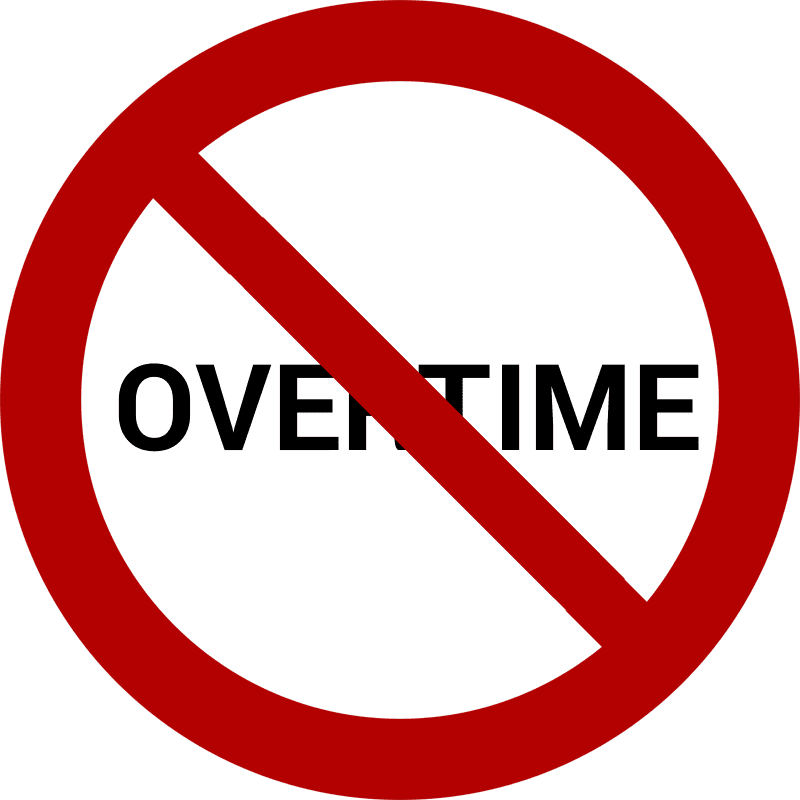Many employers simply do not allow unauthorized/unapproved overtime, and they outline this in the company handbook.
The stipulation might read something like this: “We do not pay for unauthorized overtime. Approval must be obtained prior to starting any work over 40 hours. If overtime is not approved, it is not our responsibility to pay time and a half.”
But watch out if you have a rule like this in your employee handbook! Just because it’s in the book doesn’t mean it’s validand lawful, and you probably still owe the employee for the time they worked.
(If you need an overtime calculator, try our free tool.)
Employers are rightfully frustrated when employees work longer than needed. But no matter how much an employer dislikes it, in-house policies don’t trump the law and the law says that if an employer knows or has reason to believe that an employee is working, that employee must be paid.
What the Law Says About Unapproved Overtime
“Work not requested but suffered or permitted is work time. For example, an employee may voluntarily continue to work at the end of the shift. He may be a pieceworker, he may desire to finish an assigned task or he may wish to correct errors, paste work tickets, prepare time reports or other records. The reason is immaterial. The employer knows or has reason to believe that he is continuing to work and the time is working time.” – §785.11 of Electronic Code of Federal Regulations
This rule goes for time employees work away from the office as well. If employees work extra when at home, employers must have to pay employees for their work.
“The rule is also applicable to work performed away from the premises or the job site, or even at home. If the employer knows or has reason to believe that the work is being performed, he must count the time as hours worked.” – §785.12
It is the job of management to see to it that employees are sent home when their shifts are over. If the behavior continues, employers should discipline the employee.
“In all such cases it is the duty of the management to exercise its control and see that the work is not performed if it does not want it to be performed. It cannot sit back and accept the benefits without compensating for them. The mere promulgation of a rule against such work is not enough. Management has the power to enforce the rule and must make every effort to do so.” – §785.13
Acceptable Discipline
Sometimes, an unspoken rule develops around employees who work unauthorized overtime. After a while, they may be almost expected to put in extra hours for little compensation. This is the type of abuse that the laws are trying to protect against.
For workers that routinely disobey management and intentionally or unintentionally accrue overtime, management can take action in the form of legal disciplinary methods such as:
- Disciplinary action letters
- Reduction in hours down to part time
- Demotion
- Dismissal
Written Warnings
If an employee is repetitively collecting overtime, you may want to give them written notices. This way, the employee becomes aware that they should not work extra hours during the week. Here’s an example of a written warning:
“We appreciate your assiduous working habits for our company. However, you may not work beyond 40 hours in a workweek without prior approval. Overtime pay is costly and must stay within our budget. Therefore, we require advance written approval, obtained from management prior to working overtime. If you work overtime and fail to acquire prior approval, we have to take disciplinary measures, such as a severe reduction in your working hours, loss of responsibility, and even dismissal if it continues.”
Training in Company Policy
Make sure that you properly train employees regarding how they should request overtime. If they don’t know to get prior approval or they don’t know how to get approval, then it’s hardly their fault if they work overtime.
The above letter might be a little harsh for an employee who wasn’t already familiar with the rules. Be sure employees have proper training in company policy before giving written warnings.
Make Overtime Tracking Easy
After creating a company policy about unapproved overtime, the safest thing to do is to use a time tracking service in which you set up your overtime rules. This way, your overtime is always calculated properly and accurately. With Timesheets.com, employees can write notes in their time entries so that managers can understand why that employee earned overtime. If the manager doesn’t believe that the overtime was valid, they can then take the necessary steps to resolve the issue.






4 Responses